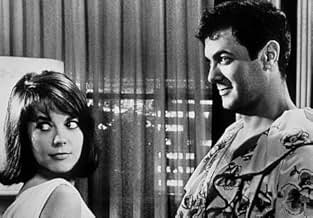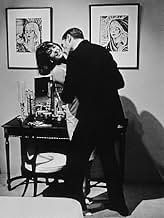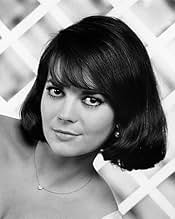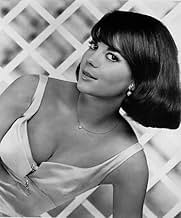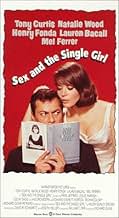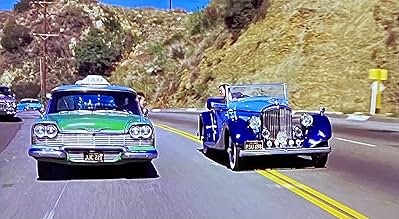IMDb RATING
6.4/10
5K
YOUR RATING
A womanizing reporter for a sleazy tabloid magazine impersonates his hen-pecked neighbor in order to get an expose on renowned psychologist Helen Gurley Brown.A womanizing reporter for a sleazy tabloid magazine impersonates his hen-pecked neighbor in order to get an expose on renowned psychologist Helen Gurley Brown.A womanizing reporter for a sleazy tabloid magazine impersonates his hen-pecked neighbor in order to get an expose on renowned psychologist Helen Gurley Brown.
- Awards
- 1 nomination total
John Alban
- Nightclub Patron
- (uncredited)
Featured reviews
"Mention sex, and the single girl is cool and shy
She objects to discussing sex with any guy
You can bet she's as interested as he
If sex weren't 50-50, where would everybody be?"
I love me a sex comedy from 1964 that openly acknowledges female desire, sex outside of marriage, erogenous zones, and male impotence. "I'm gaining confidence," says Tony Curtis in one scene, clearly alluding to an erection. Meanwhile Natalie Wood is, well, Natalie Wood, just as gorgeous and magnetic as ever, even if it's in a silly film like this. This cast, my god ... Wood, Curtis, Henry Fonda, Lauren Bacall, Mel Ferrer (loved his little dancing), Edward Everett Horton (age 78!), Otto Kruger (his last film) ... with music from Count Basie and the sultry Fran Jeffries - it's fun to see them all here, and they all get at least a moment or two to shine.
The film tries to do a little too much, adding on the zaniness of an extended chase scene at the end which got a little exhausting. I liked the quieter things early on, like the running gag of coin-operated machines (the water cooler, the bathroom sink, the mirror, etc) which are all cleverly slipped in, and maybe suggest a changing world, one which goes along with women acknowledging their physical desires. There are also several humorous references to Jack Lemmon in "Some Like it Hot" when Tony Curtis finds himself in a women's robe, even though of course Curtis himself was in the same film. And then we have the scenes with Wood staring into Curtis's eyes and becoming aroused by his ear kissing, or her prancing out to answer the phone in a low-cut dress saying "And I shall insist on the right to have as many love affairs as I please. I'm certainly not going to sacrifice one iota of my freedom or dignity for any man." My goodness, she's a joy to watch.
Where the film falters, however, is in its treatment of women in the workplace - there's a secretary who is clearly a sexual plaything of her boss, and the main character melts as soon as she meets her new patient, abandoning any kind of professionalism. The story is kicked off when tabloid magazine writers all wonder if this young psychologist is a virgin, and her colleagues wonder the same thing. That's kind of ironic, because Helen Gurley Brown's book is about acknowledging and even using sexuality for one's benefit in a savvy way - a controversial concept for a feminist to be sure - but Wood's character doesn't show signs of this, and if anything, she's pretty naïve. It kind of erodes the equality aspect of the film. Women are as sexual as men, it says, but they either want to be dominated (as Jeffries' character prefers at the end) or they don't mind sacrificing their careers to get married (as Wood and Bacall's characters do).
Hey, the film is just a playful little comedy and in 1964 I guess you could look at it as a stepping stone of feminism, just as Brown's book was, despite its mix of progressive and regressive content - but these overtones and the lengthy car chase prevented me from rating it higher. Worth watching though.
I love me a sex comedy from 1964 that openly acknowledges female desire, sex outside of marriage, erogenous zones, and male impotence. "I'm gaining confidence," says Tony Curtis in one scene, clearly alluding to an erection. Meanwhile Natalie Wood is, well, Natalie Wood, just as gorgeous and magnetic as ever, even if it's in a silly film like this. This cast, my god ... Wood, Curtis, Henry Fonda, Lauren Bacall, Mel Ferrer (loved his little dancing), Edward Everett Horton (age 78!), Otto Kruger (his last film) ... with music from Count Basie and the sultry Fran Jeffries - it's fun to see them all here, and they all get at least a moment or two to shine.
The film tries to do a little too much, adding on the zaniness of an extended chase scene at the end which got a little exhausting. I liked the quieter things early on, like the running gag of coin-operated machines (the water cooler, the bathroom sink, the mirror, etc) which are all cleverly slipped in, and maybe suggest a changing world, one which goes along with women acknowledging their physical desires. There are also several humorous references to Jack Lemmon in "Some Like it Hot" when Tony Curtis finds himself in a women's robe, even though of course Curtis himself was in the same film. And then we have the scenes with Wood staring into Curtis's eyes and becoming aroused by his ear kissing, or her prancing out to answer the phone in a low-cut dress saying "And I shall insist on the right to have as many love affairs as I please. I'm certainly not going to sacrifice one iota of my freedom or dignity for any man." My goodness, she's a joy to watch.
Where the film falters, however, is in its treatment of women in the workplace - there's a secretary who is clearly a sexual plaything of her boss, and the main character melts as soon as she meets her new patient, abandoning any kind of professionalism. The story is kicked off when tabloid magazine writers all wonder if this young psychologist is a virgin, and her colleagues wonder the same thing. That's kind of ironic, because Helen Gurley Brown's book is about acknowledging and even using sexuality for one's benefit in a savvy way - a controversial concept for a feminist to be sure - but Wood's character doesn't show signs of this, and if anything, she's pretty naïve. It kind of erodes the equality aspect of the film. Women are as sexual as men, it says, but they either want to be dominated (as Jeffries' character prefers at the end) or they don't mind sacrificing their careers to get married (as Wood and Bacall's characters do).
Hey, the film is just a playful little comedy and in 1964 I guess you could look at it as a stepping stone of feminism, just as Brown's book was, despite its mix of progressive and regressive content - but these overtones and the lengthy car chase prevented me from rating it higher. Worth watching though.
What could have been a sharp satire on 60's sexual attitudes runs basically lame throughout, the script simply comes up short. The basic mistaken identity plot device fails to provide laughs and it is so much the base of the film's story that it's failure prevents the whole from going anywhere.
However, all is not lost. There is a saving grace, and that is the presence of the then 25 year old Natalie Wood, playing the sexologist Helen Gurley Brown.
Wood, in this film is staggeringly pretty. She had, at that age, a natural girl next door beauty that has rarely if ever been rivaled in film history. Seeing this film and Wood again recently for the first time in decades was a revelation. About her, not the mediocre film.
However, all is not lost. There is a saving grace, and that is the presence of the then 25 year old Natalie Wood, playing the sexologist Helen Gurley Brown.
Wood, in this film is staggeringly pretty. She had, at that age, a natural girl next door beauty that has rarely if ever been rivaled in film history. Seeing this film and Wood again recently for the first time in decades was a revelation. About her, not the mediocre film.
There is something infectious about this comedy. The cast is about as perfect as you can get, but the subject matter was a bit awkward when compared to today's mores.
Before Carrie Bradshaw there was Helen Gurley Brown (Natalie Wood) a real life psychologist and businesswoman (she was editor of Cosmo for 32 years). Ms. Brown has just written a very controversial book about sex and the single girl (hence the title). It creates a firestorm amongst her male colleagues and her conservative patients. Tony Curtis is Bob Weston, a writer for a sleazy National Enquire-esque magazine called Stop. Bob wants to get an interview with Ms. Brown, but pretends to be a patient in need of marital counseling as a ruse. He uses his next door neighbors', Frank (Henry Fonda) and Syvia (Lauren Becall), volatile marriage as material. Of course a romance blossoms and then the normal confusion and hijinks ensue.
My issue with the film is the way Ms. Brown is portrayed. She is a befuddled, confused and weak female. She's also a terrible therapist. Despite writing a book on how a single girl can be successful, she immediately allows herself to become involved with a married patient. If I was the real Helen Brown, I would be appalled. Ms. Wood is gorgeous and I'm captivated by her screen presence, but she plays Ms. Brown as a woman who needs a man...the exact opposite of the book she wrote and my recollections of Ms. Brown in real life (mostly from reading her biography).
I understand this was set in the 1964 when views of male/female relationship skewed more towards male dominance, but it was still hard for me to accept that Ms. Brown could accomplish so much while being so desperate for a man...and a married one at that. Her therapy techniques violate every code of ethics you can imagine. Sure, it was a funny movie and I enjoyed it, but it left me feeling awkward at how simple women were portrayed.
The supporting cast is top notch and the movie's best selling point. Fonda and Bacall as the bickering neighbors are a treat. Mel Ferrer as Brown's fellow psychologist and potential love interest is hilariously smarmy and cocky. Fran Jeffries and Leslie Parish are attractive and funny love interests/secretary for Bob. Larry Storch appears in a cameo as a motorcycle cop during the finale's odd highway chase scene. Count Basie and his orchestra are here just to provide some gravitas, but don't really play any key roles.
There is a running gag about Tony Curtis wearing a woman's robe and everyone referring to him as Mr. Lemon. Curtis and Jack Lemon had starred in "Some Like It Hot" a few years before where they dressed like women. The gag was funny the first two times, but it got overplayed.
I have to say something about the chase scene. It seems that every romantic comedy in the 1960s had a chase scene. This one had a funny idea of the first three cars tossing a quarter to the toll taker. The last car leaves a dollar and takes the 75 cents. It was silly, poorly filmed, but made me laugh. Then there is another similar thing involving pretzels which I simply did not understand. I'm sure there was a point, but I missed it.
With this much talent, it was going to succeed and it does. I just wish Ms. Brown had been played a bit more wisely and not as such an easy mark for Tony Curtis' Bob Weston.
Before Carrie Bradshaw there was Helen Gurley Brown (Natalie Wood) a real life psychologist and businesswoman (she was editor of Cosmo for 32 years). Ms. Brown has just written a very controversial book about sex and the single girl (hence the title). It creates a firestorm amongst her male colleagues and her conservative patients. Tony Curtis is Bob Weston, a writer for a sleazy National Enquire-esque magazine called Stop. Bob wants to get an interview with Ms. Brown, but pretends to be a patient in need of marital counseling as a ruse. He uses his next door neighbors', Frank (Henry Fonda) and Syvia (Lauren Becall), volatile marriage as material. Of course a romance blossoms and then the normal confusion and hijinks ensue.
My issue with the film is the way Ms. Brown is portrayed. She is a befuddled, confused and weak female. She's also a terrible therapist. Despite writing a book on how a single girl can be successful, she immediately allows herself to become involved with a married patient. If I was the real Helen Brown, I would be appalled. Ms. Wood is gorgeous and I'm captivated by her screen presence, but she plays Ms. Brown as a woman who needs a man...the exact opposite of the book she wrote and my recollections of Ms. Brown in real life (mostly from reading her biography).
I understand this was set in the 1964 when views of male/female relationship skewed more towards male dominance, but it was still hard for me to accept that Ms. Brown could accomplish so much while being so desperate for a man...and a married one at that. Her therapy techniques violate every code of ethics you can imagine. Sure, it was a funny movie and I enjoyed it, but it left me feeling awkward at how simple women were portrayed.
The supporting cast is top notch and the movie's best selling point. Fonda and Bacall as the bickering neighbors are a treat. Mel Ferrer as Brown's fellow psychologist and potential love interest is hilariously smarmy and cocky. Fran Jeffries and Leslie Parish are attractive and funny love interests/secretary for Bob. Larry Storch appears in a cameo as a motorcycle cop during the finale's odd highway chase scene. Count Basie and his orchestra are here just to provide some gravitas, but don't really play any key roles.
There is a running gag about Tony Curtis wearing a woman's robe and everyone referring to him as Mr. Lemon. Curtis and Jack Lemon had starred in "Some Like It Hot" a few years before where they dressed like women. The gag was funny the first two times, but it got overplayed.
I have to say something about the chase scene. It seems that every romantic comedy in the 1960s had a chase scene. This one had a funny idea of the first three cars tossing a quarter to the toll taker. The last car leaves a dollar and takes the 75 cents. It was silly, poorly filmed, but made me laugh. Then there is another similar thing involving pretzels which I simply did not understand. I'm sure there was a point, but I missed it.
With this much talent, it was going to succeed and it does. I just wish Ms. Brown had been played a bit more wisely and not as such an easy mark for Tony Curtis' Bob Weston.
I've seen this one a few times over the years and wish it would come out in DVD. Natalie Wood was never more beautiful, and the battle of the sexes was never more fun. It's great to see a love story that doesn't resort to foul language or adult humor, but simply witty dialog and the vagaries of human nature.
Tony Curtis plays a tabloid reporter trying to get the goods on Helen Gurley Brown (played by Natalie Wood) and her personal life to find out if she actually knows anything about sex and relationships. To this end, he impersonates an acquaintance (played by Henry Fonda) whose having problems with his jealous wife (played by Lauren Bacall) so that he can pose as a patient and seek her advice.
The confusion caused by this impersonation just leads to more problems. However, this is just a sideshow to the reporter's seduction of Dr. Brown and the glorious mayhem that ensues.
Her constant comparisons of Tony Curtis to Jack Lemmon (Curtis' co-star in Some Like It Hot) will appeal anyone who's seen that classic.
Tony Curtis plays a tabloid reporter trying to get the goods on Helen Gurley Brown (played by Natalie Wood) and her personal life to find out if she actually knows anything about sex and relationships. To this end, he impersonates an acquaintance (played by Henry Fonda) whose having problems with his jealous wife (played by Lauren Bacall) so that he can pose as a patient and seek her advice.
The confusion caused by this impersonation just leads to more problems. However, this is just a sideshow to the reporter's seduction of Dr. Brown and the glorious mayhem that ensues.
Her constant comparisons of Tony Curtis to Jack Lemmon (Curtis' co-star in Some Like It Hot) will appeal anyone who's seen that classic.
I actually find this scatterbrained 1964 comedy a surprisingly amusing screwball farce all these years later despite its titillating title. So apparently does director Peyton Reed since he based most of his 2004 comic pastiche, "Down with Love", on the storyline of this movie and less so on any of the Doris Day/Rock Hudson romps of the same era. Regardless, they all have the same brew of conjugal misunderstandings, mistaken identities and leering though never explicit sexuality because those were the days when a woman's virtue would never be compromised for anyone but the right man. Directed by the heavy-handed Richard Quine ("Paris When It Sizzles") and written by Joseph Heller (later the author of "Catch-22") and David R. Schwartz, this ridiculous comedy benefits from a game cast headed by Tony Curtis still riding high from "Some Like It Hot" (which is referred to for easy laughs in the story) and Natalie Wood who shows her comedy chops with dexterity here.
Curtis plays Bob Weston, a sleazy magazine writer for a men's magazine whose editors are intent on exposing Dr. Helen Gurley Brown as a fraud as a sex expert. Author of the best-selling "Sex and the Single Girl", Brown is not at all the clench-jawed celebrity author who wrote the real book and appeared on "The Tonight Show" constantly. Instead, she is a gorgeous, intellectually prodigious 23-year-old who extols female empowerment in the bedroom. Showing off his moral depravity, Weston steals the marital woes of her next-door neighbors, pantyhose magnate Frank Broderick and his acerbic wife Sylvia, and comes to see Dr. Brown as a patient. The rest is predictable but still a good amount of fun. Curtis was still at the top of his game here showing how he can easily elicit laughs from such a vile manipulator, but it's Wood who surprises as Brown. Displaying a nervous but infectious energy that feeds nicely into the two sides of the doctor, she is funny and sexy in a way that she could never quite balance as well again in her career. Witness the hilariously conflicted drunken scene in her apartment for evidence of her talent.
Quine was smart to cast three sharp stars in the key supporting roles - Henry Fonda as the put-upon Frank browbeaten into a sad man by Lauren Bacall pulling all the stops as the shrewish basket case Sylvia is, and Mel Ferrer as Brown's somewhat ambiguous colleague. Add a sultry Fran Jeffries who performs two numbers (including the title tune) for no apparent reason except to sell records, an even sexier Leslie Parrish ("The Manchurian Candidate") as Weston's secretary, and a genuinely funny extended car chase scene, and you have the makings of an under-appreciated sex comedy. The 2009 DVD, part of the six-disc "The Natalie Wood Collection", includes a Warner Brothers cartoon ("Nelly's Folly") and the original theatrical trailer.
Curtis plays Bob Weston, a sleazy magazine writer for a men's magazine whose editors are intent on exposing Dr. Helen Gurley Brown as a fraud as a sex expert. Author of the best-selling "Sex and the Single Girl", Brown is not at all the clench-jawed celebrity author who wrote the real book and appeared on "The Tonight Show" constantly. Instead, she is a gorgeous, intellectually prodigious 23-year-old who extols female empowerment in the bedroom. Showing off his moral depravity, Weston steals the marital woes of her next-door neighbors, pantyhose magnate Frank Broderick and his acerbic wife Sylvia, and comes to see Dr. Brown as a patient. The rest is predictable but still a good amount of fun. Curtis was still at the top of his game here showing how he can easily elicit laughs from such a vile manipulator, but it's Wood who surprises as Brown. Displaying a nervous but infectious energy that feeds nicely into the two sides of the doctor, she is funny and sexy in a way that she could never quite balance as well again in her career. Witness the hilariously conflicted drunken scene in her apartment for evidence of her talent.
Quine was smart to cast three sharp stars in the key supporting roles - Henry Fonda as the put-upon Frank browbeaten into a sad man by Lauren Bacall pulling all the stops as the shrewish basket case Sylvia is, and Mel Ferrer as Brown's somewhat ambiguous colleague. Add a sultry Fran Jeffries who performs two numbers (including the title tune) for no apparent reason except to sell records, an even sexier Leslie Parrish ("The Manchurian Candidate") as Weston's secretary, and a genuinely funny extended car chase scene, and you have the makings of an under-appreciated sex comedy. The 2009 DVD, part of the six-disc "The Natalie Wood Collection", includes a Warner Brothers cartoon ("Nelly's Folly") and the original theatrical trailer.
Did you know
- TriviaIn her contract for this film, Natalie Wood required Warner Bros. to provide a portable trailer, white cigarette holders from London, oil gardenia from Cairo, days off when she was on her menstrual cycle, and a $160,000 salary.
- GoofsNone of the cabs have meters in them.
- Quotes
Helen Gurley Brown: You know, when you smile like that, you *do* look like Jack Lemmon!
- ConnectionsFeatured in Cinema: Alguns Cortes - Censura III (2015)
- How long is Sex and the Single Girl?Powered by Alexa
Details
- Release date
- Country of origin
- Language
- Also known as
- El Sexo y la Joven Soltera
- Filming locations
- Sepulveda Blvd., Los Angeles, California, USA(long chase sequence, through Sepulveda Pass, alongside the 405 Freeway)
- Production companies
- See more company credits at IMDbPro
Box office
- Gross worldwide
- $6,490
- Runtime1 hour 50 minutes
- Aspect ratio
- 1.85 : 1
Contribute to this page
Suggest an edit or add missing content


